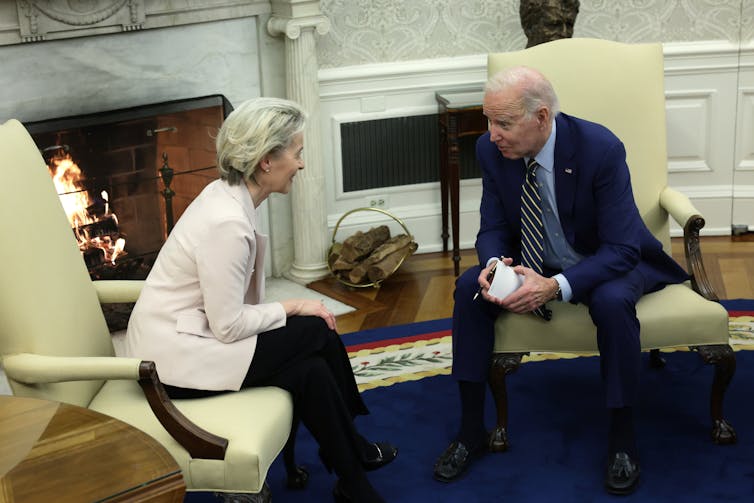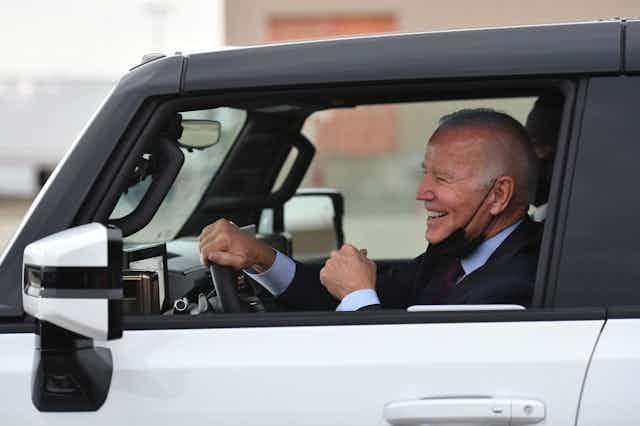The 2022 Inflation Reduction Act, President Joe Biden’s landmark climate law, is now expected to prompt a trillion dollars in government spending to fight climate change and trillions more in private investment. But the law and Biden’s broader “buy American” agenda include measures that discriminate against imports.
One year in, these policies, such as the law’s electric vehicle subsidies, appear to be succeeding at growing domestic clean energy industries – consider the US$100 billion in newly announced battery supply chain investments. But we believe the law also clearly violates international trade rules.
The problem is not the crime but the cover-up. Today’s trade rules are ill-suited for the climate crisis. However, simply tearing them down could hinder economic growth and climate progress alike.
If U.S. leaders instead take responsibility for forging an improved international trade system – rather than denying the violations of trade rules or pointing fingers at similar transgressions by trade partners – they could help put the global economy in a better position to weather increasing climate-related trade tensions.
Building, then violating WTO rules
The United States has shaped international trade rules more than any other country.
In the 1940s, the U.S. proposed rules that were eventually largely adopted as the General Agreement on Trade and Tariffs, or GATT, a series of multinational agreements to reduce trade barriers. The most ambitious of the GATT agreements was the U.S.-instigated Uruguay Round of the 1990s, which created the World Trade Organization.
Some WTO rules are vague, but others are crystal clear, including an unambiguous prohibition of subsidies contingent on the use of domestic products instead of imports. Certain provisions of the Inflation Reduction Act do exactly that, such as the electric vehicle subsidies that require a large percentage of parts to be produced in North America.
The choice facing U.S. policymakers was between accepting the Inflation Reduction Act, including its rule-breaking, protectionist elements, or missing the small window to pass federal climate legislation.
Sen. Joe Manchin (D-W.Va.) explicitly refused to provide the 50th vote needed to pass the law if it wasn’t to his liking, and among his asks was domestic sourcing requirements. More broadly, any meaningful climate legislation that does not support the local economies of fossil fuel-heavy regions may be dead on arrival in the U.S. Senate.
Without the Inflation Reduction Act, however, the U.S. had next to no chance of meeting its climate commitments, which would have dampened climate policy momentum across the world.
U.S. leaders might have been justified in begging for forgiveness after passing the legislation rather than asking for permission to violate trade rules. Instead, Sen. Ron Wyden (D-Ore.), who chairs the powerful Senate Finance Committee, said his team reviewed the international trade laws very carefully and found no violations.
Instead of an apology, U.S. leaders have said, “You’re welcome,” arguing that the subsidies will benefit other countries by accelerating the deployment of clean energy technologies and lowering costs.
While there is strong evidence to support this argument, it falls flat from a country that has failed to fulfill its obligations to take federal action on climate change for decades and just violated trade laws it has held others accountable to for so long. India’s power minister accused the West of hypocrisy, saying the Inflation Reduction Act’s protectionism will inhibit the energy transitions in developing economies.
The real concern: Rising protectionism
The Inflation Reduction Act contains a fundamental contradiction. Its promise to reduce global greenhouse gas emissions relies on the rapid diffusion of technologies, knowledge and finance across borders. Yet, its domestic subsidies may accelerate the adoption of trade barriers that inhibit these same cross-border flows, thus slowing progress on climate change.
Moreover, the investments it catalyzes will immediately benefit the U.S. economy, while the shared benefits of technological progress and emissions reductions will unfold over many decades for other countries. In the intervening years, other countries may respond with protectionist policies of their own.
Indeed, the real concern might not be the opening salvo, but the shootout of growing protectionism that ensues. For all its drawbacks, the growth in international trade since World War II has led to immense economic progress in much of the world, including the United States. The WTO and its predecessors have been instrumental in reducing harmful tariffs and providing a consistent set of trade rules to which countries are supposed to adhere.

The Biden administration is attempting to assuage these concerns by forging agreements that make more foreign producers eligible for Inflation Reduction Act subsidies. But, in our view, bespoke agreements with a handful of countries aren’t enough. A new vision is needed for international trade rules that support low trade barriers and “green industrial policies” alike.
An opportunity to modernize international trade
Global trade rules have not been updated in a generation. They are sorely in need of reform.
The usefulness of the WTO is contingent on most parties agreeing that its rules are worth following. Without a new working consensus and backing from the largest powers with effective vetoes, the organization will become irrelevant.
The first step to fixing the situation is to stop denying the problem or digging deeper holes, such as the United States’ ill-advised blocking of appointments to the WTO’s dispute settlement Appellate Body since 2017 to protest what it sees as overreach by the body.
More proactively, the U.S. can reestablish its commitment to trade rules by instigating a process to develop equitable reforms.
That could begin with a global summit to discuss the changes necessary to reflect new realities. High-level leadership from the United States would add considerable heft to the ongoing efforts to reform global trade rules.
Any fundamental rewrite of WTO rules will be a long and painstaking process. Instead, it may be sufficient to add a few clauses to existing agreements – like GATT Articles 20 and 21, which deal with exceptions to the trade rules – that clearly and transparently recognize that governments will need to nurture emerging domestic industries to cut emissions fast, ensure energy security and support vulnerable economies.
New rules could limit and define the appropriate use of green subsidies, carbon border tariffs, export and import controls and supply chain coordination. For example, the U.S. and other developed countries could agree to limit subsidies’ domestic sourcing requirements to only emerging, innovative clean technologies that require public support to commercialize. Building on this, all countries could work toward an explicit list of clean energy, transport and industrial technologies needed by all that can be traded with reduced or minimal tariffs.
Of course, these trade tools would have to be managed carefully to avoid proliferating and exacerbating tensions.
In the meantime, since U.S. leaders are already acting as if these rules exist, they’ll have to accept that other countries’ leaders may act similarly — a new Kantian Golden Rule for trade.
It may turn out that the United States did the world a favor by throwing off the shackles of outdated trade rules. That will depend on whether U.S. leaders take advantage of the opportunity to reframe the discussion around the country’s recent legislation as steps toward a modernized international trade regime that better aligns with the world’s climate goals.

